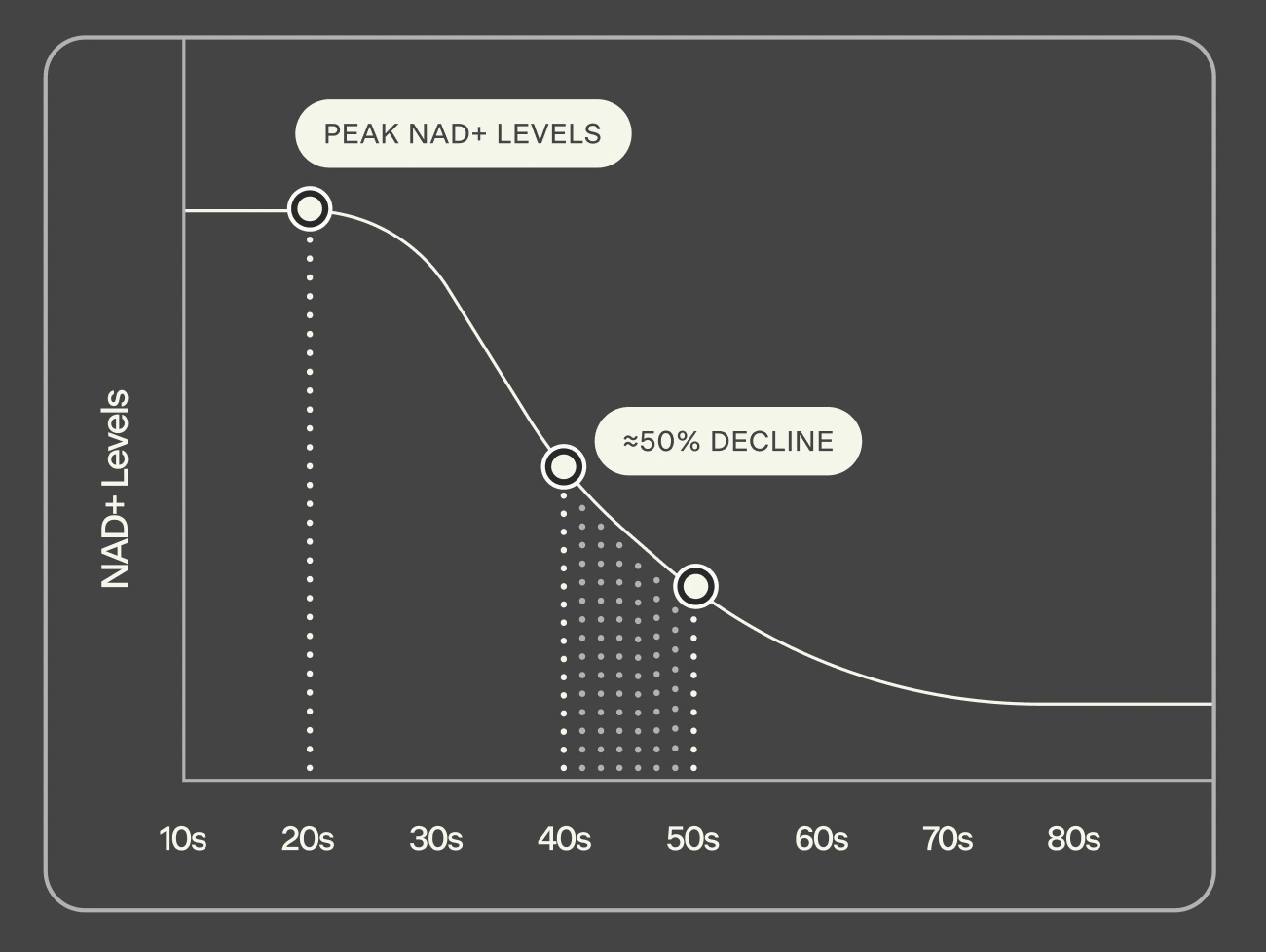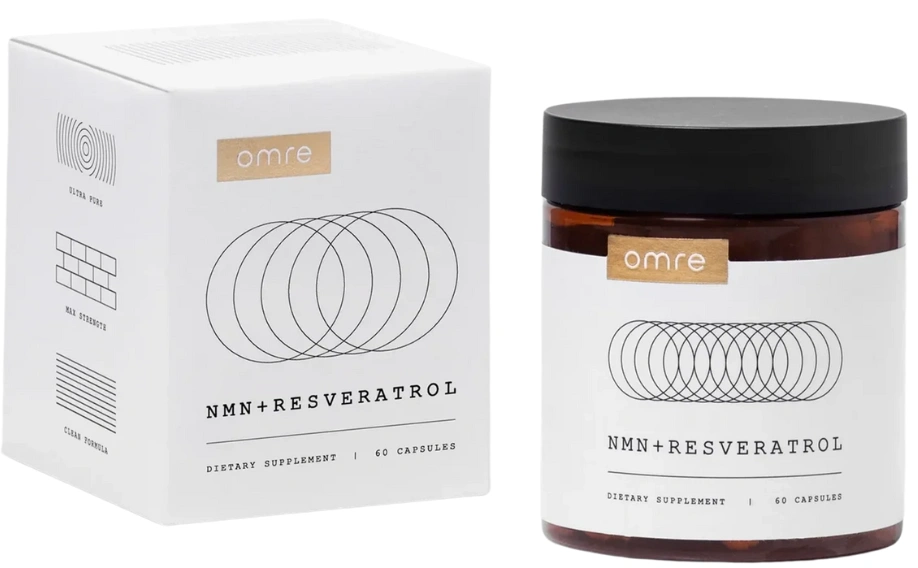Table of Contents
NAD+ is one of the most important molecules your body produces, yet research shows that NAD+ levels drop by about 50% between your 30s and 50s (1).
This decline affects energy metabolism and the efficiency with which your cells repair themselves.
If you’ve been wondering how to increase NAD+ levels naturally, the answer lies in small, science-backed habits like eating the right foods, getting enough sleep, and staying active.
Key Summary:
To increase NAD+ levels naturally, focus on daily habits that support your body’s cellular health and metabolism. Eat foods rich in vitamin B3, tryptophan, and polyphenols, stay consistent with exercise, manage stress, and get quality sleep.
Cellular NAD+ booster with ultra‑pure NMN and Resveratrol, at research‑backed doses.*NMN + Resveratrol
What Is NAD+?
NAD+ (nicotinamide adenine dinucleotide) is an essential coenzyme found in every cell of the human body. It helps produce energy, supports cellular health, repairs DNA, and regulates many important cellular processes that keep you functioning at your best.
Think of NAD+ as your body’s internal battery charger. It fuels mitochondria, the tiny engines responsible for cell metabolism, keeping everything from your brain and skeletal muscle to your heart and immune cells running efficiently.
Without enough NAD+, your cells can’t generate energy properly, leading to decreased energy, slower metabolism, and a higher risk of age-related diseases that affect overall health and muscle function.
Scientists consider NAD+ a key molecule for longevity and metabolic health. Higher levels are linked to improved brain performance, better muscle recovery, and stronger cellular defense against oxidative stress and inflammation (2).
Why Does It Matter?
NAD+ plays a major role in keeping your body energetic, resilient, and youthful by supporting cardiovascular health, brain performance, and efficient cell metabolism. When NAD+ levels stay high, your cells perform better across multiple systems.
- Energy metabolism: NAD+ helps convert nutrients into ATP, the body’s main energy source (4).
- DNA repair: It activates enzymes that fix cellular damage caused by daily wear, pollution, or UV rays (5).
- Brain function: Adequate NAD+ supports memory, focus, mental clarity, and healthy gene expression in brain cells (6).
- Healthy aging: NAD+ powers sirtuins, a group of proteins linked to slower aging and improved stress resistance (7).
When NAD+ drops, your body feels it, from lower stamina to slower recovery. Protecting and rebuilding NAD+ helps you stay energetic and age more gracefully.
What Causes NAD+ Levels to Drop?
 NAD+ levels decline naturally with age, beginning in early adulthood and dropping by roughly half by the time you reach 50. This loss contributes to lower energy, metabolic slowdown, and increased inflammation.
NAD+ levels decline naturally with age, beginning in early adulthood and dropping by roughly half by the time you reach 50. This loss contributes to lower energy, metabolic slowdown, and increased inflammation.
Several everyday factors can accelerate the decline:
Poor diet that lacks vitamin B3 and tryptophan (NAD+ precursors)
Chronic stress that increases cellular energy demand
Lack of sleep disrupting the body’s natural NAD+ production cycle
Sedentary habits that slow down mitochondrial activity
Excessive sun exposure that forces cells to use NAD+ for DNA repair
High alcohol consumption or high-sugar intake rapidly uses up NAD+ during metabolism, forcing your body to work harder to restore balance and protect cellular health.
The good news is that these are modifiable. By improving your diet, getting enough rest, and staying active, you can help your body restore NAD+ naturally and support healthier aging.
How to Increase NAD+ Levels Naturally
-v1761928607845.webp) You can naturally raise your NAD+ levels through diet and lifestyle habits that support your body’s own production pathways. Here are some of the most effective science-backed ways to do it.
You can naturally raise your NAD+ levels through diet and lifestyle habits that support your body’s own production pathways. Here are some of the most effective science-backed ways to do it.
1. Eat Foods Rich in Vitamin B3 (Niacin & Nicotinamide)
Vitamin B3, also known as niacin, nicotinamide, or nicotinic acid, is one of the main building blocks your body uses to create NAD+ and support important cellular processes like DNA repair and energy conversion.
When you eat foods rich in vitamin B3, your body converts these nutrients into NAD+ through metabolic processes that power cellular energy and repair.
Niacin-rich foods not only help increase NAD+ but also support healthy cholesterol and brain function. Including a steady source of B3 in your daily meals helps maintain consistent NAD+ activity throughout your body.
Foods high in Vitamin B3:
Chicken breast and turkey
Tuna, salmon, and sardines
Peanuts and sunflower seeds
Mushrooms (especially crimini)
Brown rice, oats, and whole wheat
Avocados and green peas
2. Include Tryptophan-Rich Foods
Tryptophan is an essential amino acid that your body converts into NAD+ through the kynurenine pathway.
While this process is slower than using vitamin B3 directly, it still contributes significantly to your overall NAD+ pool, especially when your diet provides enough protein.
Eating tryptophan-rich foods also supports serotonin production, which helps regulate mood and sleep, both of which indirectly influence healthy NAD+ levels.
Foods high in Tryptophan:
Turkey and chicken
Eggs and cheese
Milk and yogurt
Soy products (tofu, edamame)
Nuts and seeds (pumpkin seeds, almonds)
Oats and beans
3. Focus on Polyphenol-Rich Foods
Polyphenols are natural plant compounds that activate sirtuins, a family of proteins that depend on NAD+ to function. By stimulating sirtuin activity, polyphenols make your body use NAD+ more efficiently and encourage its natural recycling process.
These foods also help fight oxidative stress and inflammation, both of which are known to deplete NAD+ over time.
Foods rich in Polyphenols:
Red grapes and blueberries
Dark chocolate and cocoa powder
Green tea and black tea
Raspberries, cranberries, and cherries
Walnuts and pistachios
Olive oil and turmeric
4. Exercise Regularly
Physical activity is one of the most powerful natural ways to boost NAD+ levels. When you move your body, your cells require more energy, which increases the demand for NAD+.
This triggers your body to produce more of it to meet energy needs and repair muscles.
Both aerobic exercises like running or cycling and resistance training like weightlifting can stimulate NAD+ production.
Exercise also improves mitochondrial function, which directly depends on NAD+ to create ATP, your body’s energy currency (8).
Aim for at least 150 minutes of moderate exercise per week and mix in strength training twice weekly. Adding high-intensity interval training (HIIT) to your exercise routine can also improve muscle insulin sensitivity and boost cell metabolism.
Even simple activities like brisk walking or stretching can make a noticeable difference over time.
5. Practice Intermittent Fasting or Calorie Restriction
Fasting and caloric restriction encourage your body to repair and regenerate cells through a process called autophagy, which supports healthy cell metabolism and may even help extend lifespan. During this state, sirtuins become more active, increasing NAD+ utilization and recycling inside cells.
Studies suggest that intermittent fasting can significantly improve NAD+ metabolism by reducing oxidative stress and enhancing mitochondrial performance (9).
Common time-restricted eating patterns include:
16:8 fasting: Fast for 16 hours, eat within an 8-hour window.
5:2 plan: Eat normally five days per week, restrict caloric intake on two days.
12-hour overnight fast: Simple daily routine for beginners.
If you’re new to fasting, start gradually and stay hydrated. Always consult a healthcare professional if you have underlying medical conditions before changing your eating patterns.
6. Prioritize Sleep and Stress Management
Good sleep and stress control are two of the most overlooked ways to support healthy NAD+ production and overall health. Poor sleep and chronic stress can disrupt cellular health and slow your body’s ability to recover.
Your body’s internal clock, or circadian rhythm, is closely linked to NAD+ cycles. When you sleep well, your body naturally replenishes NAD+, helping repair cells and balance hormones.
Chronic stress, on the other hand, increases cortisol and oxidative damage, both of which use up NAD+ faster. By reducing stress and improving sleep quality, you help your cells recover and conserve their NAD+ stores.
7. Limit Alcohol and Added Sugars
Alcohol and refined sugars are major NAD+ drainers. When your body processes alcohol, it uses large amounts of NAD+ in the liver to break it down.
Over time, heavy drinking depletes these reserves and disrupts normal energy metabolism.
Similarly, diets high in added sugars increase oxidative stress and inflammation, forcing your cells to burn through more NAD+ for repair. Reducing both can have a direct and noticeable effect on how energized and focused you feel.
8. Try Safe Heat or Cold Exposure
Mild exposure to temperature stress, like a short sauna session or a cold shower, activates survival pathways that boost NAD+ production.
This process, called hormesis, trains your cells to become more resilient to stress.
Sauna use increases heat shock proteins, which protect your mitochondria and improve NAD+ recycling. Cold exposure, such as brief ice baths or cold showers, triggers metabolic activity and fat burning, both of which depend on NAD+.
Tips for safe exposure:
Start with 5–10 minutes in a sauna at moderate heat
Try ending your shower with 30 seconds of cold water
Never push through discomfort; aim for consistency, not extremes
9. Protect Your Skin from Excess Sun
Ultraviolet (UV) rays damage skin cells and consume NAD+ during DNA repair. Overexposure can lead to rapid NAD+ depletion, especially in skin tissue where cellular turnover is high.
You don’t have to avoid the sun completely, but protecting your skin helps preserve your NAD+ for internal repair and energy production instead of constant UV recovery.
10. Maintain a Healthy Weight and Active Metabolism
A balanced metabolism helps your body use NAD+ efficiently. Being overweight or inactive can increase inflammation and insulin resistance, both of which accelerate NAD+ breakdown through enzymes like CD38.
By maintaining a healthy weight, you reduce metabolic strain and preserve more NAD+ for energy and cellular repair. Combining a nutrient-rich diet with consistent physical activity is the most reliable long-term approach.
Tips for metabolic health:
Eat balanced meals with protein, healthy fats, and fiber
Avoid overeating, even with healthy foods
Stay active throughout the day (take stairs, walk after meals)
Get regular health checkups to monitor blood sugar and cholesterol
11. Support Mitochondrial Health
Your mitochondria are where most NAD+ is used. When they function well, your body naturally maintains better NAD+ balance. Protecting mitochondrial health means protecting your energy source at the cellular level.
Antioxidants and certain nutrients can protect these “powerhouses” from damage and make NAD+ utilization more efficient. This creates a positive cycle; better mitochondria lead to higher energy, which supports NAD+ regeneration.
Ways to strengthen mitochondria:
Eat antioxidant-rich foods (berries, spinach, green tea)
Get enough magnesium, zinc, and coenzyme Q10
Avoid smoking and air pollutants when possible
Stay active to stimulate mitochondrial biogenesis
NMN + Resveratrol
Cellular NAD+ booster with ultra‑pure NMN and Resveratrol, at research‑backed doses.*
Can You Get NAD+ Directly from Food?
You can’t get NAD+ directly from food, but your body can make it using precursor nutrients found in certain foods like niacin, tryptophan, and nicotinamide riboside. These compounds give your cells the raw materials they need to naturally produce and recycle NAD+.
While NAD+ itself is too large to be absorbed through digestion, eating a balanced diet rich in these precursors helps maintain healthy levels over time.
Vitamin B3 (niacin and nicotinamide) and amino acids like tryptophan are especially important because they feed into your body’s natural NAD+ synthesis pathways.
Some of the best dietary sources include lean meats, fish, eggs, nuts, whole grains, and dairy. Studies have found that niacin-rich diets can increase NAD+ levels by up to eightfold, improving mitochondrial function and energy metabolism (10).
So, while food won’t give you NAD+ directly, it supplies everything your body needs to make its own.
How Lifestyle Affects NAD+ Production
Your daily habits have a direct impact on how efficiently your body produces and conserves NAD+. Sleep quality, stress levels, and consistent exercise all affect your body’s ability to produce energy and recycle NAD+. Even small things like limiting blue light exposure at night or managing alcohol intake can help keep your cellular health in balance.
Research shows that regular exercise, adequate sleep, and controlled calorie intake all improve NAD+ metabolism by supporting sirtuin activation and mitochondrial health.
On the flip side, chronic stress, alcohol use, and high-sugar diets can rapidly drain your NAD+ stores. Small lifestyle changes, when practiced consistently, can keep this vital molecule in balance and protect long-term cellular function.
When to Consider NAD+ Precursors or Supplements
-v1761928854097.webp) If you’re older, under chronic stress, or recovering from illness, your body may struggle to produce enough NAD+ naturally. In these cases, adding NAD+ precursors or supplements can help restore balance more quickly.
If you’re older, under chronic stress, or recovering from illness, your body may struggle to produce enough NAD+ naturally. In these cases, adding NAD+ precursors or supplements can help restore balance more quickly.
Studies have found that certain precursors can safely raise NAD+ levels in humans and improve energy metabolism, endurance, and cognitive clarity. Some popular options include:
Nicotinamide Mononucleotide (NMN): A direct NAD+ precursor that enhances muscle performance and metabolic health in several clinical trials (11).
Nicotinamide Riboside (NR): Converts directly to NAD+ through the salvage pathway and has been shown to improve mitochondrial function (12).
While these supplements show promise, they should complement, not replace, core habits like balanced diet, consistent exercise, and adequate sleep.
Findings suggest that combining NMN or NR with good lifestyle habits supports multiple pathways of NAD+ production and improves overall health.
Always talk to your healthcare provider before adding NAD+ boosters, especially if you’re taking medication or managing metabolic disorders or other health issues. Some NAD+ therapies are still being studied, and long-term safety data are limited.
Read more: 9 Best NAD Supplements in 2025: Tested & Reviewed
Key Benefits of Maintaining Healthy NAD+ Levels
Keeping your NAD+ levels high supports energy, brain health, and longevity. Evidence suggests that balanced NAD+ levels are linked to better cellular repair, metabolic performance, and cognitive resilience.
Some of the main benefits include:
Higher energy levels: NAD+ fuels ATP production, the body’s main energy source.
Better cellular repair: It supports enzymes that fix DNA damage from aging and stress.
Improved brain function: NAD+ supports neurotransmitter balance and cognitive clarity.
Healthy metabolism: It helps regulate insulin sensitivity and fat burning.
Longevity support: NAD+ activates sirtuins and PARPs, both associated with slower aging.
Reduced inflammation: It protects cells from oxidative stress that accelerates disease.
Maintaining healthy NAD+ levels isn’t just about aging more slowly; it’s about keeping your body energized, clear-headed, and strong throughout life.
Final Words
NAD+ is at the heart of how your body creates energy, repairs damage, and stays youthful.
While levels naturally decline with age, you can slow that process and even rebuild your NAD+ supply through daily habits, like eating niacin-rich foods, exercising regularly, sleeping well, and managing stress.
Lifestyle changes, combined with key nutrients, can make a noticeable difference in how energetic and resilient you feel. If you want to give your body extra support, Omre NMN + Resveratrol offers a science-backed way to boost your NAD+ naturally.
If you want to give your body extra support, Omre NMN + Resveratrol offers a science-backed way to boost your NAD+ naturally.
This formula combines NMN, a proven NAD+ precursor, with Resveratrol, a powerful sirtuin activator, to help your cells repair, energize, and perform at their best.
It’s an easy daily step toward long-term vitality and healthy aging.
FAQs
How long does it take to raise NAD+ levels naturally?
You may start noticing improvements in energy and focus within 2 to 6 weeks of consistent habits like better nutrition, exercise, and sleep. Studies have found that NAD+ precursors and fasting can enhance levels even faster when used together.
Can I get enough NAD+ from food alone?
Food provides precursors like niacin and tryptophan, which your body converts into NAD+. However, studies show that aging, stress, and poor sleep increase demand, so diet alone may not fully maintain optimal levels as you get older.
Are natural NAD+ boosters safe for everyone?
For most healthy adults, yes. Eating NAD+-supporting foods and following natural habits are safe and beneficial. If you plan to take supplements like NMN or NR, it’s best to consult your doctor, especially if you’re pregnant, nursing, or on medication.
Does coffee affect NAD+?
Coffee doesn’t directly reduce NAD+ levels, but too much caffeine can interfere with sleep, which affects your body’s natural NAD+ rhythm. Moderate coffee intake is fine, but good sleep remains one of the most effective NAD+ boosters.





